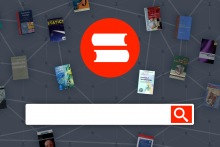How did Spull come into being?
‘Students actually have an awful lot of books on their book-shelves that they no longer use. We saw how this could be a problem, particularly due to the number of requests for specific textbooks in my student's association, VGST. A senior student may have books that a first-year student needs, or someone who is taking a minor may be searching for specific books to borrow. This is why we came up with Spull. It enables you to look through everyone's bookshelves without having to ask.’
How does it work?
‘You register via your Facebook account. Afterwards you start searching for books that you have. You can then add these to your own bookshelf in Spull and indicate whether you want to sell them or loan them out. Anyone who wants to sell, buy or borrow books, can become a member of a group, for instance the UT group or your students' association.’
What makes Spull so effective?
‘We bring supply and demand together. We wanted to make it as cheap and user-friendly as possible. For instance, you do not have to search using the ISBN. The website does it for you if you search using the title or the author. And Facebook keeps you informed about all registrations.’
‘We are currently focussing on Enschede. If you want to buy a book, you can simply make an appointment with the party who is selling. This saves on delivery charges, and neither do we ask for commission.’
What future do you envisage for Spull?
‘For the moment we are focussing on textbooks, particularly among UT students and Saxion students. If we keep on growing, we shall focus on all groups that share books, for instance, groups of friends, churches or libraries. In that case we will have to come up with a revenue model, perhaps in the form of extra, paid services for reading groups. But this is not something we are thinking about just yet. We are still students.’







